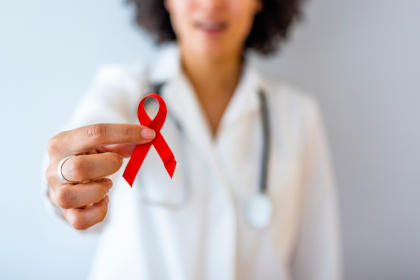
In the United States, there are roughly 1.2 million HIV-positive people, and about 36,136 new HIV diagnoses were made in 2022, according to a CDC report.
Get IVIG Copay Assistance
IVIG Financial AssistanceHIV infection weakens the immune system and makes a person’s body more vulnerable to other infections. Over time, HIV infection progresses into its potentially serious life-threatening stage called AIDS (acquired immunodeficiency syndrome).
Though there is no cure for HIV, effective treatments like antiretroviral therapy and IVIG therapy can help to stop the progression of the disease and boost immunity in HIV patients.
This article discusses the basics of HIV, how it affects your immune system, and how IVIG therapy can help.
What Is HIV Infection?
HIV (human immunodeficiency virus) is an infection caused by the HIV virus. This virus is transmitted to your body through sexual intercourse (unprotected) or by using HIV-contaminated needles. Once inside the body, HIV remains there for a lifetime.
How Does HIV Affect Your Immune System?
Once HIV enters your body, it affects your immune system in the following ways:
It Destroys CD4 Helper T Cells
HIV attacks and destroys specific types of immune cells called CD4 helper cells or T cells, which generally help your body fight infection or illness. Without HIV treatment, minor ailments such as colds can be much more severe.
Furthermore, when the number of CD4 helper cells falls below 200 cells/mm3 or when people develop one or more opportunistic infections, it leads to a serious stage of HIV called AIDS (acquired immunodeficiency syndrome).
It Impairs B Cells’ Functions
Apart from directly destroying CD4 helper T cells, HIV also indirectly impairs the function of B cells. Normally, CD4 T cells activate B cells to produce antibodies against the virus. However, when HIV destroys the CD4 cells, the B cells fail to mount a strong antibody immune response.
HIV also hyperactivates and exhausts the B cells, which results in the production of ineffective and poor-quality antibodies that are unable to cope with the HIV infection. Over time, the antibodies’ quality and specificity begin to decline, further contributing to weakening the immune response.
Hence, during HIV infection, the virus not only directly destroys the CD4 helper T cells but also indirectly impairs the function of B cells.
Get Your IVIG Dose
At-Home InfusionHow Can IVIG Help HIV Patients?
Intravenous immunoglobulin (IVIG) therapy works to boost the immune system in the patient’s body by providing a broad spectrum of antibodies. In fact, various reports have shown that receiving IVIG therapy could be beneficial for HIV patients.

IVIG and HIV Patients
Though the exact mechanism of IVIG is not clear, this therapy can help HIV patients in the following ways:
It Provides Additional Immune Support
The antibodies provided by IVIG do not kill the virus but provide additional immune support to HIV patients to fight infections they are prone to. Since HIV patients have weak immune systems, they are more susceptible to opportunistic bacterial and viral infections such as respiratory infections.
The FDA has also approved the use of IVIG therapy to reduce the risk of serious bacterial infections in children with HIV. For example, a study conducted on HIV-infected children with recurrent infections and some HIV-infected adults showed that IVIG reduces the risk of bacterial infection in these patients. Similarly, another study of symptomatic HIV-infected children showed that IVIG decreases the incidence of respiratory infections and mortality in children.
It Increases the Level of CD4 and CD8 Cells
IVIG therapy also increases the level of CD4 and CD8 cells in HIV patients. For example, in a case report of an HIV-1 positive patient with Guillain-Barre Syndrome (GBS), IVIG treatment increased the level of CD4 and CD8 cell counts and decreased the plasma viral load.
It Reduces Inflammation in HIV Patients
IVIG therapy has anti-inflammatory properties. Patients with HIV often experience chronic inflammation, which further damages their immune systems. The anti-inflammatory effect of IVIG can help reduce inflammation and slow down the progression of HIV in patients.
Summary
IVIG therapy can be a beneficial option for HIV patients. IVIG not only boosts immunity but also reduces the risks of bacterial infections and inflammation and increases the CD4 cell count in patients. It is recommended to consult your doctor before undergoing IVIG treatment to get the best results.
REFERENCES:
- Yap, P., & Williams, P. (1988). The treatment of human immunodeficiency virus-infected patients with intravenous immunoglobulin. Journal of Hospital Infection, 12, 35-46. https://doi.org/10.1016/0195-6701(88)90028-X
- Yap, P. L. (1994). Does intravenous immune globulin have a role in HIV-infected patients? Clinical and Experimental Immunology, 97(Suppl 1), 59-67. https://www.ncbi.nlm.nih.gov/pmc/articles/PMC1550376/
- Nicholas, K. J., Zern, E. K., Barnett, L., Smith, R. M., Lorey, S. L., Copeland, C. A., Sadagopal, S., & Kalams, S. A. (2013). B Cell Responses to HIV Antigen Are a Potent Correlate of Viremia in HIV-1 Infection and Improve with PD-1 Blockade. PLOS ONE, 8(12), e84185. https://doi.org/10.1371/journal.pone.0084185
- Rosca, E. C., Rosca, O., & Simu, M. (2015). Intravenous immunoglobulin treatment in a HIV-1 positive patient with Guillain-Barré syndrome. International Immunopharmacology, 29(2), 964-965. https://doi.org/10.1016/j.intimp.2015.09.023
- Pastori, D., Esposito, A., & Mezzaroma, I. (2010). Immunomodulatory effects of intravenous immunoglobulins (IVIGs) in HIV-1 disease: a systematic review. International Reviews of Immunology, 30(1), 44–66. https://doi.org/10.3109/08830185.2010.529975
- Mofenson, L. M., Bethel, J., Moye Jr, J., Flyer, P., & Nugent, R. (1993). Effect of intravenous immunoglobulin (IVIG) on CD4+ lymphocyte decline in HIV-infected children in a clinical trial of IVIG infection prophylaxis. JAIDS Journal of Acquired Immune Deficiency Syndromes, 6(10), 1103-1113.
- Yap, P. L., M. Todd, A. A., Williams, P. E., Hague, R. A., Mok, J., Burns, S. M., & Brettle, R. P. (1991). Use of intravenous immunoglobulin in acquired immune deficiency syndrome. Cancer, 68(S6), 1440-1450. https://doi.org/10.1002/1097-0142(19910915)68:6+<1440::AID-CNCR2820681407>3.0.CO;2-Y
- Gor, D., Singh, V., Gupta, V., & Levitt, M. (2022). A persistent parvovirus infection causing anemia in an HIV patient requiring intravenous immunoglobulin maintenance therapy. Curēus. https://doi.org/10.7759/cureus.24627
- Mofenson, L. M., & Moye, J. (1993). Intravenous Immune Globulin for the Prevention of Infections in Children with Symptomatic Human Immunodeficiency Virus Infection. Pediatric Research, 33(4), S80-S89. https://doi.org/10.1203/00006450-199304001-00015


